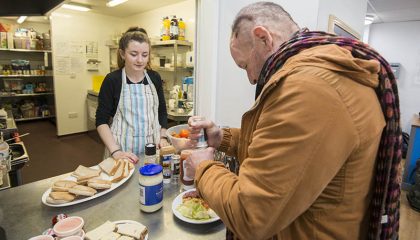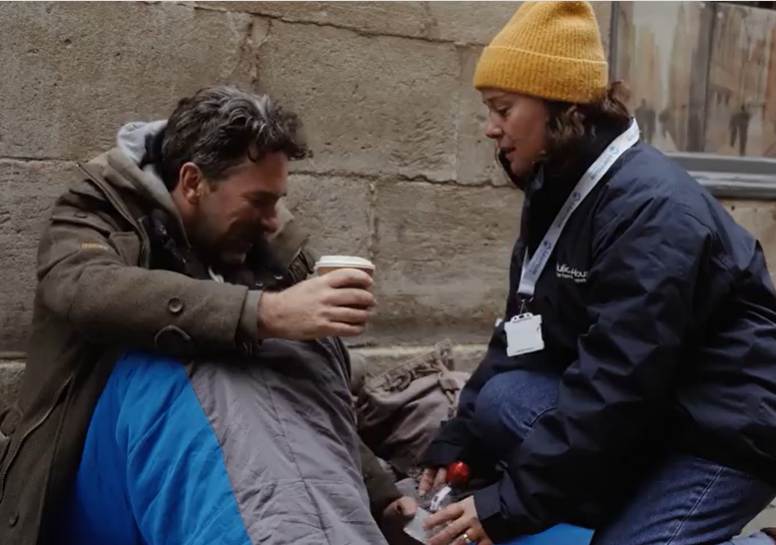
Julian House has provided specialist services to people leaving prison or otherwise involved or at risk of involvement with the criminal justice system since 2006.
We currently provide 64 dedicated supported housing accommodation spaces to prison leavers across the South-West and have worked with many individuals across all our services who have been involved in the criminal justice system.
Currently there are 78,711 people in prison and young offender institutions in England and Wales of which 3181 are women. According to National Probation Service data (year ending 31st October 2019):1,340 people returning to the South-West were released from prisons across England with unsettled accommodation (141 were women): of these: 877 were recorded as homeless (242 rough sleeping); 320 with friends/family (transient) and 172 temporarily accommodated in insecure arrangements.
Within our dedicated prison leaver accommodation, we provide trauma informed 1:1 support sessions and enhanced housing management to enable individuals to address the underlying issues which have led to their initial offending and reduce the risk of further offending behaviour and recidivism. We work in partnership with the National Probation Service, Prison Resettlement teams, Police, primary care, and mental health services and community addiction treatment providers to provide ‘wrap around’ support for people leaving prisons who move into Julian House accommodation.
We also provide specialist prison resettlement outreach support and housing liaison services in B&NES, Exeter, Basingstoke, Weymouth, Somerset, and South Gloucestershire for prison leavers who are deemed at most risk of rough sleeping or unsettled living and require engagement with substance misuse recovery services upon release.
A significant number of service users are both perpetrators and victims of crime. Many of the individuals involved in the criminal justice system have multi adverse childhood experiences (ACE) and or significant trauma and abuse leading to reduced adult life opportunities. A recent survey of 2,500 people (ref RDA the Knot report) with lived experience of repeat custodial sentencing, paint a stark picture of entangled disadvantages starting from childhood and continuing into adulthood. Consistent themes emerge of multiple experiences of neglect, abuse and household dysfunction, multiple and traumatic losses and bereavement primarily driven by drug overdose and suicides, and experiences of community violence – of family and friends being beaten up, murdered, or families being driven out of their homes.
These experiences often happen in the context of profound poverty, with unsafe or unsuitable accommodation, not being able to afford to feed the family, high levels of school exclusions, and persistent unemployment. People from black and minority ethnic communities are even more likely to live in poverty, experience huge inequalities in access to care, particularly for mental ill-health, and be over-represented in the criminal justice system including for low-level and non-violent offences. The current criminal justice approach to has led to a steady rise in the proportion of people with a history of repeat offending. People with histories of repeat offending have been rising, and now account for about 60% of all offenders.
Julian House, along with our partnership agencies focus on providing the effective service user support required to enable individuals to address the ‘causes of causes’ – looking behind the crime to understand what is driving this problematic behaviour – the immediate health need, entrenched addiction issues, lack of employment skills, poverty, trauma, and inequalities. This focus on sustained support to address underlying causes aims to bring about sustained pro social change in thinking, attitudes, and behaviour; requires significant and sustained criminal justice agencies and voluntary sector specialist support.
A well-established key indicator for the successful and sustained rehabilitation of an individual is their ability to access and sustain employment. Contrary to some views, Julian House’s experience has been, people leaving prison are motivated to continue building on any work related, training or education they have obtained whilst in custody and frequently express their intention to make a ‘fresh start’ and work upon release. Despite service users expressing aspirations to work, they face multiple barriers to employment including lack of, or interrupted employment history, lack of confidence in job applications, lowered aspirations, limited references, qualifications and experience. Service users are often offered employment which is low paid or insecure with short term contracts; few individuals having the skills or experience to access higher paid or secure employment.
Mental Health continues to be a cause of significant concern for those people entering prison.
- A Prison Reform Trust Report states that 26% of women and 16% of men said they had received treatment for a mental health problem in the year before custody.
- 25% of women and 15% of men in prison reported symptoms indicative of psychosis. The rate among the general public is about 4%.
Self-inflicted deaths are 8.6 times more likely in prison than in the general population. - 70% of people who died from self-inflicted means whilst in prison had already been identified as having mental health needs. However, the Prisons and Probation Ombudsman (PPO) found that concerns about mental health problems had only been flagged on entry to the prison for just over half of these people.
- The report investigated and found that nearly one in five of those diagnosed with a mental health problem received no care from a mental health professional in prison and also found that no mental health referral was made when it should have been in 29% of self-inflicted deaths where mental health needs had already been identified.
- 40% of prisons inspected in 2016–17 had inadequate or no training for prison officers to know when to refer a person for mental health support
You can learn more about our criminal justice services on Our Services page, or read an interview with some staff members from a supported housing project here.






